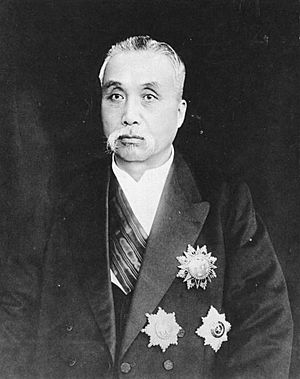Xu Shichang facts for kids
Quick facts for kids
Xu Shichang
|
|
|---|---|
 |
|
| President of the Republic of China | |
| In office 10 October 1918 – 2 June 1922 |
|
| Preceded by | Feng Guozhang |
| Succeeded by | Zhou Ziqi |
| Premier of the Republic of China | |
| In office 1 May 1914 – 22 December 1915 |
|
| Preceded by | Sun Baoqi |
| Succeeded by | Lou Tseng-Tsiang |
| In office 22 March 1916 – 23 April 1916 |
|
| Preceded by | Lou Tseng-Tsiang |
| Succeeded by | Duan Qirui |
| 1st Minister of the Cabinet of the Imperial Cabinet |
|
| In office 8 May 1911 – 1 November 1911 Serving with Natong
|
|
| Monarch | Xuantong Emperor |
| Prime Minister | Yikuang, Prince Qing |
| Preceded by | Position established |
| Succeeded by | Position abolished |
| Personal details | |
| Born | 20 October 1855 Weihui, Henan, Qing Dynasty |
| Died | 5 June 1939 (aged 83) Republic of China |
Xu Shichang (also known as Hsu Shih-chang; Chinese: 徐世昌; pinyin: Xú Shìchāng; Wade–Giles: Hsü2 Shih4-ch'ang1; courtesy name: Juren; October 20, 1855 – June 5, 1939) was an important leader in China. He served as the President of the Republic of China in Beijing. His term as president lasted from October 10, 1918, to June 2, 1922. He was the only president during the warlord era who was not a military general. His presidency was also the longest during that time.
Early Life and Career
Xu Shichang was born in Weihui, Henan province. His family originally came from Yinzhou District in Zhejiang Province. He became a very close friend of Yuan Shikai, who was a powerful military leader.
Xu Shichang held many important jobs in the government. He was once the Viceroy of the Three Northeast Provinces, which meant he governed a large area in northeastern China. He also served as a minister in Prince Qing's Cabinet. He even tutored Puyi, who was the last Emperor of China.
Even though Xu Shichang was not a soldier, he was made chief of the general staff at the end of the Qing dynasty. After the monarchy was overthrown and the Republic of China was formed, Yuan Shikai appointed him as a minister of state in 1912. Xu later resigned from his post as secretary of state in late 1915. This was to protest Yuan Shikai's attempt to become emperor. However, he returned to his job after Yuan gave up his plan to restore the monarchy in March 1916.
Becoming President
Xu Shichang became president mostly because of Duan Qirui and his Anhui military group. He was chosen because he was a civilian, meaning he wasn't a military general. However, he still had strong connections to the Beiyang Army. He was also seen as neutral, meaning he didn't strongly favor one military group over another.
Since he didn't have his own military power, Xu Shichang had to be very clever. He tried to balance the power between different military leaders. These included Duan Qirui, Zhili leader Cao Kun, and Fengtian leader Zhang Zuolin. This helped him stay in power for a longer time.
Challenges During His Presidency
Xu Shichang believed that the monarchy might eventually return. To help Emperor Puyi prepare for the future, he hired Reginald Johnston. Johnston taught Puyi subjects like political science, history, and English.
On November 18, 1918, Xu Shichang organized a huge celebration in Beijing. This was to mark China's victory in World War I. However, he later sent Chinese troops to join the Allied intervention in the Russian Civil War. He also tried to make peace with Sun Yat-sen's rival government in the south. During his presidency, intellectuals were given more freedom to express their ideas.
This period of relative calm changed when news arrived from France. It was revealed that Duan Qirui had secretly promised Japan control over German territory in Shandong province. This news led to large student protests in China, known as the May Fourth Movement. Xu Shichang responded by making many arrests. A Muslim leader named Ma Jun also led protests against the unfair Treaty of Versailles. As a result, China refused to sign or agree to the treaty.
The events surrounding the Treaty of Versailles caused the alliance between the Zhili and Anhui military groups to break apart. Duan Qirui's group was defeated. This led to a period of intense warlordism in China, where different military leaders fought for control. Conflict with the southern government started again in 1920. Xu Shichang also failed to regain control of Mongolia. Eventually, Cao Kun, who never liked Xu, forced him to leave office. Li Yuanhong then became president again.
See also
 In Spanish: Xu Shichang para niños
In Spanish: Xu Shichang para niños
 | Audre Lorde |
 | John Berry Meachum |
 | Ferdinand Lee Barnett |

